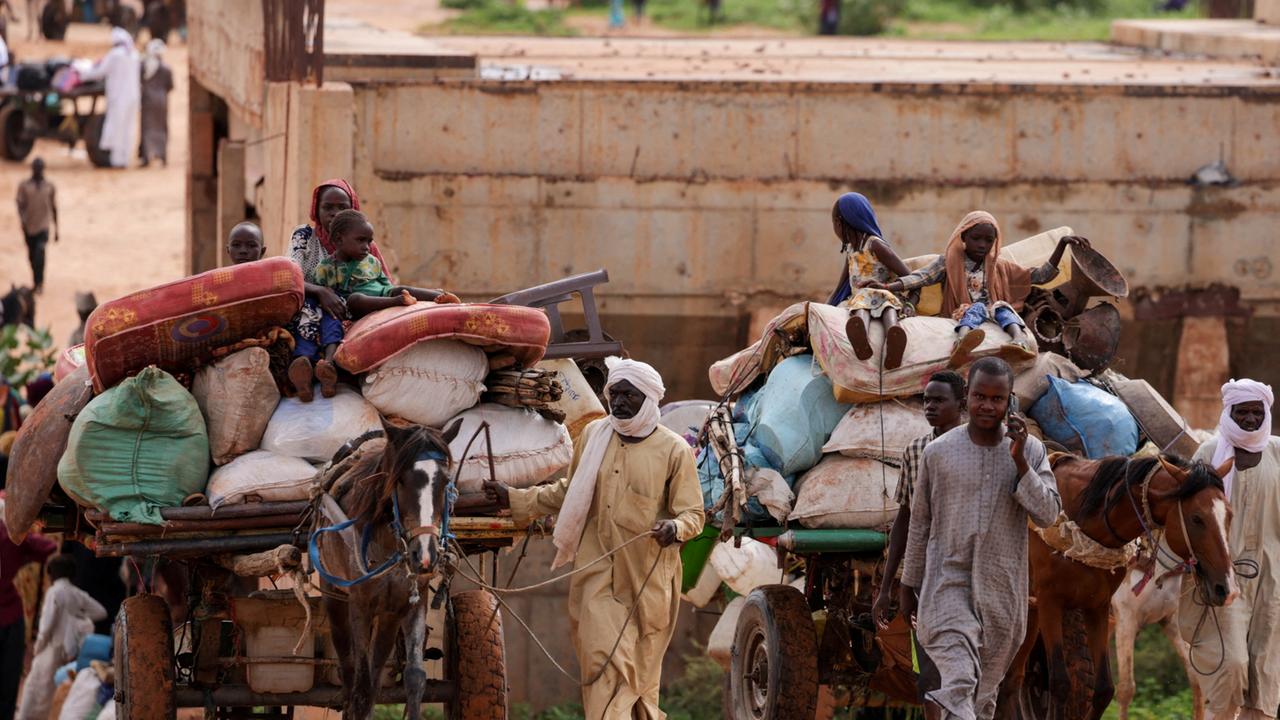Fighting between the Sudanese army and militias has been going on for six months. Six million people had to flee and are left with nothing. Now there is also the threat of a hunger crisis.
The wind blows across the barren landscape in the far east of Chad, kicks up desert sand and tugs at the tent tarpaulins. Women in colorful robes try to cook on the open fire in front of the refugee tents, a tiny baby squints in the bright sunlight.
Pictures from the Reuters news agency show those who made it: families from the heavily contested Darfur region in western Sudan who fled across the border towards Chad. They are alive – but are faced with nothing.
“My husband and I have four children,” says the young mother Iqbal. “Life is very hard. We get a ten-kilo bag of food a month here, but that’s not enough. The food just isn’t enough.”
Aid organizations the money runs out
The need in the refugee camps is enormous. The international aid organizations lack the money to alleviate the humanitarian catastrophe. At least 800,000 refugees from Sudan live in Chad alone, says Pierre Honnorat from the United Nations World Food Program – a big city full of people in need of help.
“From December we can no longer help, we have nothing left. We urgently need financing options for this crisis,” said Honnorat. “It’s urgent because we first have to buy the food and bring it to Chad – and then transport it to the border here – so that the people here get at least one meal a day, at least one a day.”
Fight all over the country
In Sudan, the country’s two most powerful men and their troops have been fighting each other for more than six months. On one side is the military chief and de facto ruler of the country, Abdel Fattah Burhan, with his army, on the other side is his former deputy, the militia leader Mohammed Hamdan Dagalo, known as Hemeti, who runs the so-called Rapid Support Forces, or RSF for short , commanded. The fighting is taking place all over the country, often in the middle of residential areas.
“The situation in Sudan couldn’t be worse,” says Jan Egeland, director of the Norwegian Refugee Council, in an interview with the ARD. It pains him that the world is overlooking one of the greatest humanitarian catastrophes of our generation. “Yes, there is the war in Ukraine, the crisis in Gaza. But how can the world forget that six million people had to flee here – and all in just a few months? Women are being raped, hospitals are being bombed, refugee camps are being shelled,” he said Egeland.
“Massive ethnic cleansing”
The situation is reportedly particularly bad in Darfur, a region in the far west of Sudan. The militias belonging to the RSF in particular are accused of brutal human rights crimes – in the past and today: the Darfur crisis of 2003 seems to be repeating itself.
“There is currently massive ethnic cleansing in Darfur,” says Egeland. “I remember when I worked at the UN 20 years ago, Darfur was a big issue. Then-President George Bush and British Prime Minister Tony Blair were determined to help the people of Darfur.” Today the same thing is happening again in Darfur: hundreds of thousands are being driven out, thousands have already been massacred because they belong to the wrong ethnic group – and no one seems to notice that.
And there is no end to the crisis in sight: all international efforts to mediate a ceasefire have so far failed. And international powers are fueling the conflict even further – the United Arab Emirates are said to have a hand in Sudan, and Russia’s Wagner troops are also active. The reason: Sudan is rich in raw materials – the RSF militias control numerous gold mines in the country.
“An entire civilization torn apart”
The relationship between the Sudanese government and the United Nations has been tense for months; German special envoy Perthes was declared “persona non grata” in the summer and resigned. Sudan has now called on the United Nations to end the stabilization mission in Sudan entirely. Will Sudan then finally sink into chaos?
“An entire civilization has been torn to pieces, 24 million people need help. If what is happening in Sudan happened anywhere other than Africa, it would be at the top of the political agenda,” says Egeland. “It’s the greatest forgotten war of our time. We really need help!”
Tilo Spanhel, ARD Cairo, tagesschau, October 15, 2023 8:18 a.m





